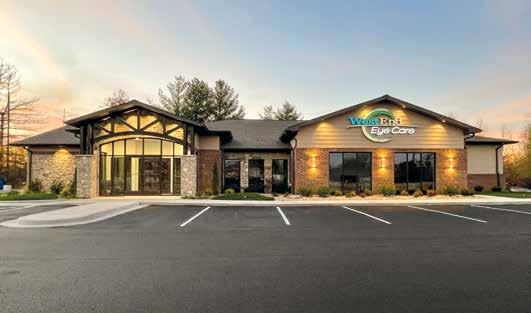
2 minute read
Alumni Lead Advocacy Efforts
Less than a year after graduating from SCO, MATTHEW BLASEG, OD ’22, found himself testifying before a South Dakota Senate committee in favor of an optometry scope expansion bill.
“Testifying was quite intimidating — a room full of legislators watching you as you do your best to represent optometry,” says Dr. Blaseg, adding that while the bill passed the Senate committee, it failed the House committee by a vote. Despite the intense preparation and nervewracking experience, Dr. Blaseg says he would “absolutely” be willing to testify again. “Healthcare is constantly evolving and improving, and we need to make sure optometry is not left behind.”
From local and regional groups to state and national associations,
SCO graduates like Blaseg are, along with building thriving optometry careers, taking on leadership roles in the world of optometric advocacy. “Seeing many of our [SCO] professors and staff members active in advocating for optometry is contagious,” Dr. Blaseg says. “While at SCO I was the president of the Optometric Private Practice club. This experience fueled me to realize that I can be a leader among my peers.”
BELINDA STARKEY, OD ’04, an AOA trustee and president of Optometry Cares® —
STEVEN REED, OD ’95, who is vice president of the American Optometric Association and is set to become president-elect next year, was also inspired at SCO to start advocating for his profession nearly three decades ago. “The day I took my licensing exam, the Mississippi Optometric Association’s executive director plugged me into the [association] committee structure,” Dr. Reed says. He advanced through the state association ranks, eventually becoming president.
Attending Optometry’s Meeting, the annual AOA conference, and serving in the House of Delegates prompted Dr. Reed to pursue national advocacy. “Exposure to that level inspired me to go further in my volunteering,” he says. After expressing interest in AOA leadership, Dr. Reed was appointed to a committee. “That was the beginning of my pathway to being on the AOA Board.”
In his years with AOA, Dr. Reed has helped optometrists win victories at the state and national levels. Optometrists in 10 states now have laser privileges, he says — a direct result of collaborative advocacy. “We are making progress to stop vision plan abuses that are harmful to our patients and small businesses,” Dr. Reed says. “We have also made significant progress on issues with the [Department of Veterans Affairs], ensuring that our veterans have access to high quality eye care.”
Optometric advocacy organizations always need new volunteers, Dr. Reed says. “Some wait until they feel they are ready to contribute,” he says, “but becoming a better volunteer comes through service. Just get started.”
The AOA Foundation, says AOA’s student organization is a great place for optometrists in training to get started with advocacy. “AOSA exposed me to organized optometry at the national level and gave me a sense of the importance of giving back to the profession,” she says. “As a student, let your AOSA officers know that you are interested.”
For alumni, Dr. Starkey notes that it’s never too late to get started in advocacy. “In order to be good stewards of our profession,” she says, “we must work to preserve what we have, to promote the profession to the public, and to continue to acquire education to advance the profession.”
Participating in advocacy isn’t just important to the profession, says CHRIS FISHER, OD ’13, a member of the California Optometric Association Board of Trustees. It’s also fun. “Our associations provide an opportunity to network with our peers,” he says.
“We are the ones to direct how and what the associations do. Joining the AOA and state associations gives you a voice to direct your future.”
Last year, Dr. Fisher was part of the effort to pass an expansive scope of practice bill in California. The bill passed every hurdle — and was then vetoed by the governor. Though the outcome was “devastating,” Dr. Fisher says it renewed his motivation as an optometric advocate.
“An army of individuals is required to get legislation passed when there is constant opposition,” he says. “There will always be.”








